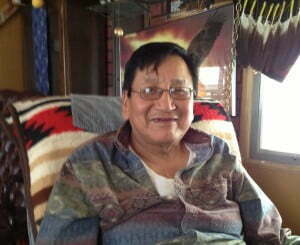Leon Hale, Walking in Two Worlds
When I think about the idea of “walking in two worlds,” I consider everything that encompasses. Does it mean that I am two people? Does it mean that I am a fragmented person? Perhaps it means both, or neither. At any rate, I had the honor of visiting with Leon Hale, an elderly man from the Cheyenne River Indian Reservation, who now lives in Rapid City, South Dakota. I met him at his home to discuss the concept of “living in two worlds” and what followed was an experience.
Leon has health problems and we talked a bit about the dialysis he must have three times a week in order to stay alive. He told me about his heart surgery and shared stories about breaking bones in his legs and arms throughout his life. But, he never lost a sense of optimism about what it all meant. He smiled and was grateful to be “hanging tough,” still moving forward in his life and thankful for the dialysis machine that let him enjoy spending time with his grandkids and pass on the wisdom his grandfather offered to him. We then spoke about the weather and this sparked our deeper discussion of what it means to exist within two very different cultures.
Leon talked about the old ways and how he prays for Mother Earth when he goes to Bear Butte, a sacred site to the Lakota People. He told me he is sad when he thinks about the way the earth has been abused and is struggling to find its own balance again… how the wolves disappeared and now the mountain lions are not living the way they naturally would… how the factors in nature that once controlled the wildlife and the waterways and the forests are all out of balance or no longer exist. I saw in his words a man that understands where we, as Native Americans, come from – how we view the earth and the physical environment around us. I could see the concern in his eyes and his struggle with the way things are and the way they should be when he spoke about nature and our Mother Earth. Two worlds…
Leon then recalled from his youth the way his mother would cook wild game for dinner and the way you need to honor the animals when you take them for food… how hunting was a co-existent way to live with all the creatures of the earth… how hunting was never about sport or dominance over another species. Two worlds…
He spoke about his love for the Lakota language and how it gives him peace and comfort speaking with another Lakota… how he can remember, so clearly, the words of his grandfather and his grandmother… the words they spoke and the wisdom they offered him as he struggled with feeling comfort and peace at home. But, Leon also remembers having erasers thrown at him or rulers slapped over his hands at school for speaking his Lakota language, and the teachers being so forceful and cruel in their ways to change him into someone else. Leon had a special place along the river near his small country school, where he would hide among the bushes and plants and look at the sky and chase the squirrels. And he compared his school experience to the way the Lakota and his grandparents felt about learning and knowledge… about being aware of wisdom and that the language is where it starts… speaking your own language, the Lakota language that to this day gives Leon peace and comfort. He explained that the teaching and the use of language from his grandparents was like an eagle plume. It was sacred and he felt good and alive in what he was learning. Two worlds…
And yet, as Leon reflected over his life, he told me the one thing he would change if he could go back would be to get an education. He said the teachers are much different today than they were in his time… that he has met his grandkids’ teachers and they seem eager to help his grandkids learn… eager to teach them what they need to know in order to exist and succeed in today’s world. But, Leon also understands the importance of teaching his grandkids what his grandfather taught him… to “learn to face the future”… to ‘learn the ways of the others.” I see this as an imperative for Leon, who wants his grandchildren to have it easier than he did… to not struggle as much he did with the idea that he was a Native American being pushed into a world that did not coincide with his own culture.
As I sat and listened to Leon muse about all of these things and more, I realized something. He is living in two worlds still. He knows we cannot go back to the way things were supposed to be… the way they were for millennia before this continent changed populations. And, he knows he can indeed look back to how we existed before and carry that into this new way of living… to sit in a circle and talk as a family… to see it can be a cultural struggle to get an education, yet education can help you succeed in the mainstream world. He knows that each culture offers something new and unique. Two worlds…
As I left Leon’s home, he thanked me in Lakota, and I promised I’d return to hear what he could tell me about anything he wanted to talk about… I left feeling that a person can be two things… that I can be two things. I can be a Sisseton-Wahpeton Dakota, descended from and existing because of my ancestors and what they did for me so many generations in the past. I can also be an American citizen that offers his culture to those around him and accepts theirs with understanding and a willingness to face the future… a future that isn’t grim because of how history turned out… rather, a future that is forged one day at a time and can be exactly what I strive to make of it. I can live in two worlds by looking back and looking forward.



